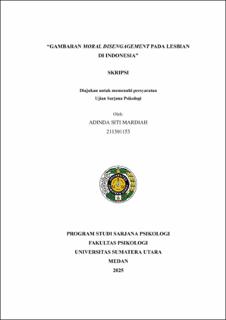Gambaran Moral Disengagement pada Lesbian di Indonesia
Moral Disengagement in Lesbians in Indonesia

Date
2025Author
Mardiah, Adinda Siti
Advisor(s)
Tuapattinaja, Josetta Maria Remila
Metadata
Show full item recordAbstract
The social context of Indonesia, which strongly upholds heteronormativity, places
lesbians in a vulnerable position as they are considered to violate religious,
cultural, and gender role norms. This pressure creates moral conflict and feelings
of guilt, leading to the activation of Albert Bandura’s (2016) concept of moral
disengagement as a psychosocial strategy of self-justification to deactivate moral
control. This process operates through eight mechanisms: moral justification,
euphemistic labeling, palliative comparison, displacement of responsibility,
diffusion of responsibility, minimizing, ignoring, or misconstruing the
consequences, dehumanization, and attribution of blame. A qualitative
phenomenological approach was employed to explore the experiences of two
lesbian participants selected using the snowball sampling technique. Data were
collected through in-depth interviews and analyzed thematically. The findings
show that Participant 1 activated all eight mechanisms of moral disengagement,
with moral justification and euphemistic labeling being the most prominent. In
contrast, Participant 2 did not activate euphemistic labeling but showed stronger
activation of palliative comparison and diffusion of responsibility. Overall, the
activation of moral disengagement mechanisms was dynamic and adaptive,
shifting according to the challenges and pressures encountered during childhood,
adolescence, and adulthood.
Collections
- Undergraduate Theses [1451]
